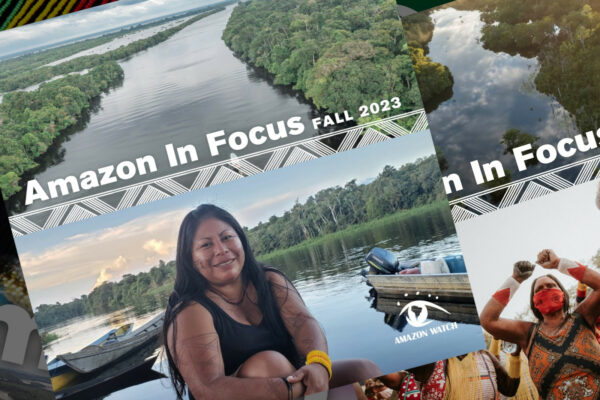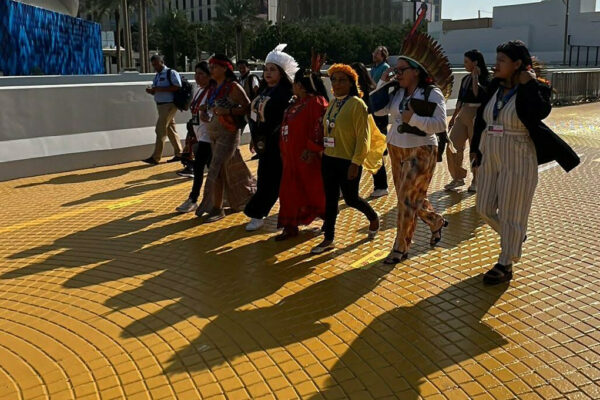English-language translation of interview with Andrés Sandi, president of FECONACO,
From Nuevo Andoas, Pluspetrol’s base in Lot 1AB – 7 a.m., 23 October 2006
(Interviewer: Atossa Soltani, Amazon Watch)
The reasons for the demonstrations that caused the stoppage of oil production are related to the contamination of the sources of water arising from the direct introduction of wastewater into the Corrientes River [by Pluspetrol], as well as because the people, fish, and animals have cadmium and lead in their blood, all of which has been directly demonstrated [in its study of the area] by DIGESA. And because of all of that, we began this take-over [of the petroleum sites], and during these 14 days we have paralyzed oil production in Lot 1AB as well as Lot 8 – no production activities have taken place, all has been totally paralyzed. That is what I can tell you – we have been waiting for so long and the State has not listened to us, and this is the only defense we have against not having been listened to [by the State]. Today has made history because the [indigenous] people have hardened themselves and gotten for themselves what the Achuar communities have wanted [for so long].
Well, the Achuar people are content for having succeeded in getting all that they have. They have achieved all that they have wanted to achieve and what they have hoped to achieve. They have defeated the State. The State wanted to do it [deal with the Achuar people and their demands] its own way, but thanks to the fact that the people have pressed for what they want for their indigenous communities – demanding this for so long but forgotten by the government and the Peruvian State – the indigenous community has reasonable justification for complaining. Today has become historic because the Achuar people have achieved all that it wanted for the development of their communities.
Well, the negotiation of the Integrated Development Plan contains elements on health, education, environment, production, 5% of the petroleum revenues, and re-injection [of wastewater] – 100% of the production waters dumped into the Corrientes River will be re-injected from this moment on until December 2007. In Lot 8, starting in 2007, 50% [will be re-injected] and 50% from [January] 2008 until July [2008]. This is what has been agreed to.
That is, for the first time the Achuar communities of the Corrientes River have been recognized, their demands have been recognized, and [the fact that] indigenous people live there. We have now even met with the government, we have now demanded the recognition that we exist, that there are Achuar communities in the Corrientes River [basin]. For the first time in history, we are acting on a national and international level.
We have advanced considerably. It is a triumph for the first time in history that we have but a [large] company in its place. Some information has been put out that the Peruvian Ombudsman has liberated us. This is a lie because the Ombudsman’s office only yesterday grasped the gravity of the situation, that this struggle has been carried out by the indigenous communities and their leader who has led them – but this struggle [and its success] has nothing to do with the Ombudsman’s office, I want you to understand that and to clarify that. Our situation was initiated by the Achuar communities of the Corrientes River basin because we couldn’t continue to suffer for long periods of time the negative impacts [of Pluspetrol’s actions] that are harming us, that are making us very ill with diseases from the contaminants [in the water as a result of Pluspetrol activities], that is why the Achuar reacted as they did by rising up in the Corrientes River area.
And at about 11 a.m. or noon today [23 October 2006], we will be signing [the accord] together with the Ministers of Health and Energy and Mines, as well as the regional government in Loreto. Members of [the Peruvian] Congress will there, we will be there in Dorisa, we will be signing the accord, and that will signify the end of the occupation of the two [oil] blocks of the people who are there now.
The Achuar communities continue to state that they do not want any more petroleum companies [to begin exploration or exploitation in their area], because they see now the history of what has happened to them and they do not want to have that happen again through the granting of new petroleum concessions, because what the Achuar has lived through for the last 35 or 36 years they do not want to see repeated. They already have a history [of being harmed], which is why the only thing they hope for is that no more petroleum concessions will be given and the Achuar are saying to the government that regardless what it does, the Achuar has spoken, and so we have made the demand and the denunciation many times to the government, but we do so again: we do not want more petroleum concessions given.
– – – – – – – – – – – – – – – – – – – – – – – – – – – – – –
English-language translation of interview with Petronila Chumpi,
informal Achuar woman leader,
from Nuevo Andoas, Pluspetrol’s base in Lot 1AB – 7 a.m., 23 October 2006
(Interviewer: Atossa Soltani, Amazon Watch)
We, as indigenous women, played a very important role, the very first time we have done so – accompanying the men and walking together with them. That is how we are now. We have struggled, I cannot deny that. And we have supported our brothers, our fathers we have supported. And so I think that from the perspective of an indigenous Achuar woman’s role, it was very, very interesting because we were the ones who confronted the police, we [the women] were the ones who took the police officers’ weapons from them while the [indigenous] men carried on heated discussions with the police. So that was extraordinary for a woman, for a lady, to take on that kind of role, while simultaneously bringing food, inviting the people to eat, cooking, and stuff like that, also getting up early in the mornings, staying up all night without sleep, and that is very, very difficult. It was tough to walk to get to where we wanted to and that was very, very important. It was also difficult for us to understand this problem [Pluspetrol’s actions] because it is incomprehensible the problems that it has brought to us. Many times we have acted; also [at other times] we have kept silent due to our lack of understanding as to how to confront all of those problems of intoxication [illnesses/health issues resulting from the contaminated water]. We are here, we are going to [continue to] be there walking with our brothers, with our children. What else can I tell you that is important? It is also very difficult to walk [i.e. continue in the struggle against petroleum interests] – [to confront] this type of problem, above all to confront the petroleum industry and companies.
This mobilization, this strength, is not only composed of women, but rather children also, and the parents, young people as well, and I say that to emphasize that for us it is very, very historic [the mobilization and successful result]. Our children will see that, [as will] our grandchildren, the children of their children, and so for us this is very important, a success demonstrating how we were able to put the brakes on the State itself and on the company [Pluspetrol] permitting them to hear our voice and in that way we can develop as an indigenous community.













